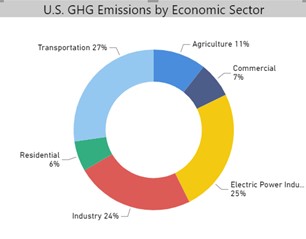Supply Chain Sustainability: An Opportunity for U.S. Businesses
July 29, 2022
This post contains external links. Please review our external linking policy.
Caroline Kaufman and Francys Veras are International Trade Specialists in the Office of Supply Chain, Professional & Business Services.
The Covid-19 pandemic exposed the vulnerabilities of global supply chains, making them a household matter for everyday Americans. Across the country, Americans have experienced shortages of essential products, such as toilet paper, disinfecting wipes, and bottled water, as well as long delays to receive products ranging from household furniture to exercise bikes. As images of empty store shelves and backlogged cargo ships in ports became commonplace, so did the call for stronger, more resilient U.S. supply chains.
For U.S. supply chains to be strong and resilient, they must also be sustainable. Each process in the supply chain, from procurement of sustainable raw materials to low-emission delivery of the product, can be assessed to mitigate its environmental impacts. Sustainable supply chains not only protect global value chains in periods of crisis like a pandemic, but they can also improve overall productivity and help businesses reduce waste. In addressing the climate crisis, stakeholders across the supply chain must recognize that dependence on fossil fuels for the majority of supply chain activity is not a long-term solution.
In 2020, the U.S. transportation sector accounted for the largest portion (27 percent) of total U.S. greenhouse gas (GHG) emissions. Freight transportation accounted for over one third of those emissions. With transportation services responsible for the movement of global trade, these supply chain services industries are increasingly critical to addressing not only the supply chain crisis, but also the climate crisis.
Moving the Needle Forward: Public and Private Sector Must Work Together
The Biden-Harris Administration has prioritized strengthening U.S. supply chains, as well as creating sustainable U.S. supply chains. In November 2021, Congress passed the Biden-Harris Administration’s Bipartisan Infrastructure Law, or the Infrastructure Investments and Jobs Act (IIJA), which invests $17 billion in modernizing infrastructure at coastal ports, inland ports, waterways, and land ports of entry.
The Administration has also worked closely with the private sector to set ambitious goals across the freight logistics industries, for example by announcing the Sustainable Aviation Fuel (SAF) Grand Challenge in September 2021. The SAF Grand Challenge seeks to inspire the domestic production of at least three billion gallons per year of SAF by 2030 and 35 billion gallons of SAF by 2050, enough to supply 100 percent of projected U.S. aviation fuel demand in 2050.
While government initiatives are part of the solution, supply chain sustainability initiatives must also be led by the private sector. Across the different freight transportation industries – including aviation, maritime, rail and truck – U.S. businesses have committed to creating both a more resilient and more sustainable domestic supply chain.
ITA’s Supply Chain Sustainability Efforts and New Report
To help identify where opportunities and challenges exist for U.S. supply chain businesses, ITA’s Office of Supply Chain, Professional and Business Services (OSCPBS) works to address policy and regulatory issues to ensure that the U.S. supply chain system will be among the world’s greenest and most sustainable in facilitating the movement of goods across the nation and abroad. We identify the latest U.S. industry developments in supply chain sustainability. Using that information, we support industry in reducing their carbon footprint and work to enhance the competitiveness of sustainable U.S. transportation and logistics services.
ITA’s OSCPBS recently published a Supply Chain Sustainability Report that examines related key trends, public and private sector initiatives for a more sustainable future across the major modes of freight transportation, and describes how the Biden-Harris Administration and industry have worked together to set ambitious goals to reduce emissions, an important groundwork for progress. It notes that fuel technologies are a key area for research and investment for U.S. freight companies, and it offers examples of ongoing developments. It also notes that while the private sector has been increasingly innovating to address climate change, there continues to be a great need for strong regulatory and market incentives to accelerate decarbonization in the freight sector.
